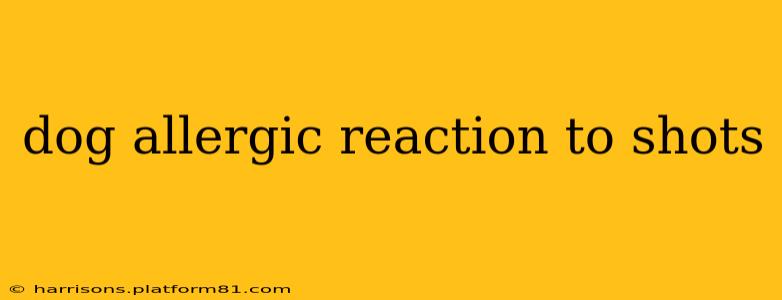Vaccinations are crucial for protecting your canine companion from various diseases. However, just like humans, dogs can experience allergic reactions to these shots. While rare, it's vital for pet owners to understand the signs, causes, and appropriate responses to ensure their dog's safety and well-being. This comprehensive guide will delve into dog allergic reactions to shots, covering everything from recognizing symptoms to managing the situation effectively.
What are the Signs of an Allergic Reaction to Shots in Dogs?
Recognizing the symptoms of an allergic reaction is paramount. Reactions can range from mild to severe, and prompt veterinary intervention is crucial in severe cases. Mild reactions might manifest as:
- Mild Swelling at the Injection Site: This is often a localized reaction and may subside on its own.
- Slight Itching or Hives: Localized itching or a small area of hives near the injection site.
- Lethargy or Mild Vomiting: Your dog may seem unusually tired or experience a single episode of vomiting.
Severe reactions, requiring immediate veterinary attention, include:
- Anaphylaxis: This life-threatening reaction involves difficulty breathing, swelling of the face and throat, collapse, and potential cardiac arrest. It requires immediate veterinary care.
- Hives and Swelling Across the Body: Widespread hives and swelling beyond the injection site indicate a significant allergic reaction.
- Vomiting and Diarrhea: Severe, persistent vomiting and diarrhea are concerning signs.
- Difficulty Breathing: Labored breathing, wheezing, or gasping for air necessitates emergency veterinary treatment.
What Causes Allergic Reactions to Shots in Dogs?
Allergic reactions are triggered by the dog's immune system overreacting to a component within the vaccine. This can be:
- Specific Vaccine Ingredients: Certain preservatives, stabilizers, or other components within the vaccine formulation can trigger an allergic response.
- Individual Sensitivity: Some dogs are simply more sensitive than others, predisposed to experiencing allergic reactions to various substances.
- Prior Exposure: A prior exposure to a similar substance might increase the likelihood of an allergic reaction to a subsequent exposure.
How are Allergic Reactions to Shots in Dogs Treated?
Treatment depends on the severity of the reaction.
- Mild Reactions: Mild reactions often require no specific treatment beyond observation. However, contact your veterinarian to inform them of the reaction.
- Severe Reactions: Severe reactions, such as anaphylaxis, are life-threatening emergencies requiring immediate veterinary intervention. Treatment typically involves administering epinephrine (adrenaline) to counteract the allergic response, along with supportive care like oxygen therapy and intravenous fluids.
Can I Prevent Allergic Reactions to Shots in Dogs?
While you can't eliminate the risk entirely, you can take steps to minimize it:
- Discuss Vaccine History: Inform your veterinarian about your dog's history, including any prior allergic reactions to medications or vaccines.
- Slow Introduction: In some cases, your vet may recommend a slower introduction of vaccines, particularly if your dog has a history of allergies.
- Post-Vaccination Observation: Carefully monitor your dog for any signs of a reaction for at least 24 hours following vaccination.
- Emergency Preparedness: Know the signs of an allergic reaction and have a plan for immediate veterinary care if a reaction occurs. Consider discussing the possibility of an epinephrine auto-injector with your veterinarian.
What are the Long-Term Effects of an Allergic Reaction to Shots?
The long-term effects depend on the severity of the reaction and the promptness of treatment. Mild reactions usually have no long-term consequences. However, severe reactions, especially untreated anaphylaxis, can potentially lead to organ damage or even death. Your veterinarian can provide guidance on long-term care and monitoring based on your dog's experience.
My Dog Had a Reaction, Should I Still Vaccinate Them?
This is a crucial question to discuss with your veterinarian. While a previous reaction warrants caution, most dogs can still receive vaccinations safely, potentially using different vaccines or a modified vaccination schedule. Your vet can help determine the best course of action for your dog's individual needs.
Are Certain Dog Breeds More Prone to Vaccine Reactions?
While no breed is entirely immune, some breeds may exhibit a higher predisposition to allergic reactions. However, this is not a definitive predictor, and any dog can potentially experience a vaccine reaction. Consult your veterinarian for breed-specific information and vaccination recommendations.
By understanding the signs, causes, treatment, and prevention strategies related to dog allergic reactions to shots, you can better protect your beloved companion. Remember, prompt veterinary attention is crucial in any case of suspected allergic reaction. Always consult your veterinarian before making any decisions regarding your dog's health and vaccination schedule.
